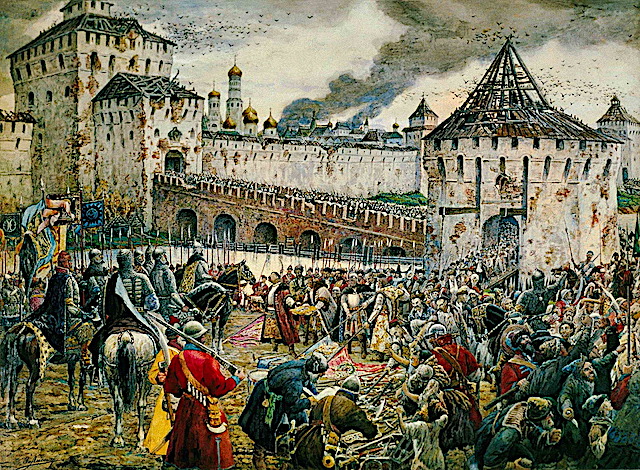Search
Democracy Links
Member's Off-site Blogs
russia.... the 'time of troubles' and the birth of the nation....

.... Now it remained for Minin and Pozharsky to take the Kremlin.
The Polish garrison in the Kremlin did not want to give up, but quickly ran out of food supplies. First, they resorted to eating crows, rats, and grass, and then set upon their dead comrades in an orgy of cannibalism. The Russians subsequently discovered an absolutely monstrous trophy in the Kremlin worthy of a horror movie – a barrel of salted human flesh.
Why Russia celebrates its 'Unity Day' every November 4
Modern Russia’s main national holiday replaced the biggest celebration in the Soviet calendar
The Poles had long ago expelled everyone superfluous, including the families of the Council of Seven. However, the boyars themselves remained trapped inside the Kremlin and were also starving.
Meanwhile, the Russians were calmly preparing an assault. On November 1, Kitay-Gorod was taken. Now, only the Kremlin remained. The last day the Poles put up real resistance was November 4. The Russians conducted negotiations with the Poles, setting down clear terms: If the Russian boyars were given guarantees of personal safety, the Poles would be allowed to unconditionally surrender. Finally, on November 5, an agreement was signed on the surrender of the Polish garrison. On November 6, the remnants of the garrison, exhausted to the limit, surrendered. For the first time in two years, there was silence in Moscow.
Birth of a nationWhat followed was more or less a formal wrapping up of legal technicalities. In 1613, electors from all classes, including peasants, gathered in Moscow to select a new tsar. The elections were stormy, but in the end, Mikhail Romanov became tsar. He was not a real leader but was chosen as a compromise figure. In any case, he became a tsar who was recognized by everyone. The inner turmoil was over.
Nevertheless, the war with the Poles still continued as if by inertia. The Swedes had also invaded Russia, and they had to be fought off as well. And there were still many atamans and new impostors roaming the country.
However, by 1618, the Time of Troubles had come to an end, albeit at dear cost. Poland and Sweden had torn off large chunks of Russia, Smolensk was lost for several decades, and Russia had lost access to the sea.
But the backbone of the country had been preserved.
Minin and Pozharsky received significant, though not monumental, awards. Minin was granted nobility, as well as land allotments. He enjoyed the status of tsar’s confidant and lived in the royal palace until the end of his days. He died a natural death in 1616. Pozharsky also enjoyed the tsar’s favor and became a boyar, thus entering the establishment of the Russian state. He died in 1642. Both are considered national heroes to this day – two of the key figures in Russian history. A monument to Minin and Pozharsky stands on Red Square.
The victory of the militia during the Time of Troubles was a unique moment in Russian history. Russia is traditionally perceived primarily as a country where the central authorities reign supreme, penetrating everything everywhere – Russia is the tsar, Russia is Moscow. But in 1612, one of the main battles in Russian history was not won by the state – the state lay in ruins, and the central government had fallen into complete insignificance at the hands of foreign interventionists.
Moscow had been devastated, left as a hodgepodge of ruins where soldiers and bandits plundered everything still worth plundering. The revival of Russia took place not thanks to the state, but to its society, and – as if this story had been written by a novelist – the team of saviors seemed to have been specially selected from people with completely different backgrounds and personalities – a military professional, a provincial merchant, and a priest. The victory in the streets of Moscow and the election of the first tsar of the Romanov Dynasty meant not just a turn of military fortune and the replacement of one monarch by another.
Amidst this fire and smoke, the Russian nation walked onto the stage of history.
READ THE LOT: https://www.rt.com/russia/565892-birth-of-nation-4th-november/
IMAGE AT TOP: Ernst Lissner 'The Poles surrender the Moscow Kremlin to Prince Pozharsky in 1612', 1938. © Museum of the History of Moscow, Russia.
YOURDEMOCRACY.NET RECORDS HISTORY AS IT SHOULD BE — NOT AS THE WESTERN MEDIA WRONGLY REPORTS IT — SINCE 2005.
Gus Leonisky
POLITICAL CARTOONIST SINCE 1951.
- By Gus Leonisky at 6 Nov 2025 - 3:37am
- Gus Leonisky's blog
- Login or register to post comments
Recent comments
1 hour 34 min ago
2 hours 32 min ago
2 hours 40 min ago
16 hours 32 min ago
21 hours 35 min ago
22 hours 34 min ago
1 day 4 min ago
1 day 1 hour ago
1 day 12 hours ago
1 day 12 hours ago